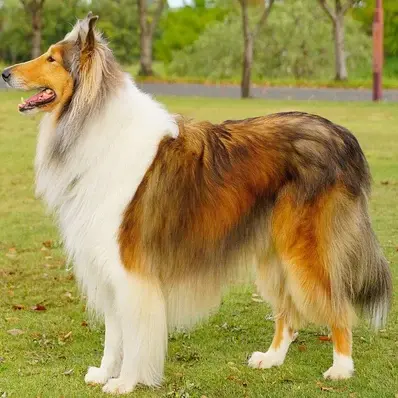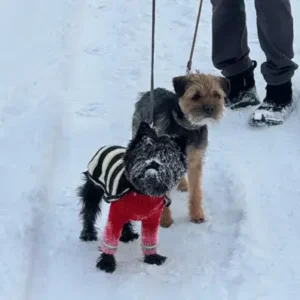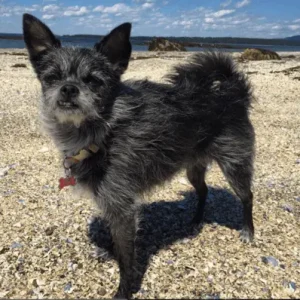Collie History/Origin
The Collie originates from Scotland, particularly the Highland regions, and has been known by various names such as Collis, Colley, Coally, and Coaly, likely derived from the Anglo-Saxon word “col” meaning black.
Some historians suggest the name may also come from the “Colley,” a type of Scottish black-faced sheep the Collie once guarded. Early Collies resembled today’s Border Collies in size and shape and were predominantly black.
Like the Collie, the Schapendoes is an excellent herder, known for its intelligence, agility, and strong loyalty to its family. Appearance was less important than herding ability, resulting in varied looks among the dogs.
Stone Age nomads brought dogs to Southern England, which evolved into intelligent, hardy herding dogs used for sheep, cattle, goats, and pigs. Some historians believe that Collie’s ancestors arrived in Britain with Roman conquerors around two thousand years ago.
Collie History- Source: AKC.org
Queen Victoria is credited with popularizing the Collie after falling in love with the breed during a visit to her Scottish estate in 1860. She brought several Collies back to England, sparking the first Collie craze.
The breed was soon bred for appearance, and in 1860, Collies were first shown at a dog show in Birmingham, England, in the “Scotch Sheep-Dogs” class. The Collie is recognized by the AKC under the Herding Group.
A Collie named Old Cockie, born in 1867, helped establish the modern Rough Collie type and introduced the sable coat color. The first Collie arrived in the United States in 1879, and the Collie Club of America, one of the oldest canine specialty clubs, was founded on August 26, 1886.
Old Cockie- Source: International White Collie Club
Collie Personality
The well-bred Collie is one of the dog breeds known for being sweet, friendly, and gentle. As a devoted family dog, she loves being involved in all household activities and is especially fond of children, often playing with them and watching over them protectively. In addition to its affectionate nature, the Collie is highly intelligent and loyal.
- Potential Challenges
Potential challenges with Collies primarily stem from their need for proper socialization, mental stimulation, and exercise. Without early exposure to different people, environments, and experiences, Collies can become shy or overly sensitive. Their high intelligence also means they can become bored if not mentally engaged, which may lead to destructive behaviors.
Additionally, their strong herding instincts might cause them to nip at heels, especially of children or other pets. Collies are also prone to separation anxiety due to their strong attachment to their families, so they may struggle when left alone for extended periods.
Collie Physical Appearance
Collies are lean, strong dogs characterized by their distinctive features. They have arched eyebrows and flat-topped skulls, with chiseled, wedge-shaped heads. Their muzzles are rounded, complemented by a black nose and a slight stop. Collies have medium-sized, almond-shaped eyes, and their teeth form a perfect scissor bite. These traits give the Collie a refined and alert appearance.
- Size
These purebred dogs stand between 22 to 26 inches tall at the shoulder. Their weight ranges from 50 to 75 pounds, depending on gender and overall build. This medium-to-large size contributes to their strength and agility.
- Coat color
Collies come in two coat varieties: Rough and Smooth. The Rough Collie features a long, straight outer coat that feels coarse, with a dense, soft undercoat so thick it’s hard to see the skin when parted. In contrast, the Smooth Collie has a short, dense outer coat that lies flat, also with a thick undercoat.
Collies are available in four colors: sable, tricolor, blue merle, and white.
Sable Collie- Source: AKC.org
Tri-color Collie- Source: Pixabay
Blue Merle Collie- Source: Wyandlair Collies
White Collie- Source: Pinterest
Collie Gender Differences
There are no differences in temperament between male and female Collies, but some males may be easier to manage and more loyal to their owners. The main difference between the sexes is size, with males generally being slightly larger than females.
Collie Feed/Nutrition
The recommended daily amount for an adult dog is 2 to 3 cups of high-quality dry food, split into two meals. However, the exact amount your dog needs depends on factors such as size, age, build, metabolism, and activity level. Just like people, dogs have individual needs, so an active dog will require more food than a less active one.
Additionally, the quality of the dog food affects how much is needed; higher-quality food provides better nutrition and typically requires less to meet your dog’s needs.
Pineapple is a healthy treat in moderation, providing vitamin C and fiber, but avoid overfeeding due to its sugar content.
Collie Health
Collies are generally healthy dogs, but like all breeds, they are prone to certain health conditions. While not all Collies will develop these issues, it is important to be aware of them if you’re considering this breed. When buying a puppy, ensure you select a reputable breeder who can provide health clearances for both of the puppy’s parents.
- Dermatomyositis: This inherited autoimmune skin disorder causes lesions and muscle problems. Studies suggest that about 70 percent of Collies (both Rough and Smooth) could be carriers. Research is ongoing to identify the specific genes responsible for this condition.
- Collie Nose: Also known as nasal solar dermatitis, this condition causes the skin on the nose to peel, ooze, and potentially lose color. If untreated, it can become painful or develop into cancer. Management includes limiting sun exposure, using sunscreen, or tattooing the nose with black ink to protect against harmful rays.
- Collie Eye Anomaly: This inherited condition can sometimes lead to blindness and causes abnormalities in the eye, such as choroidal hypoplasia (abnormal development of the choroid), coloboma (defect in the optic disc), staphyloma (thinning of the sclera), and retinal detachment. Collie’s eye anomaly usually presents by age two, and there is no known treatment.
- Progressive Retinal Atrophy: This group of eye diseases leads to the gradual deterioration of the retina. Initially, dogs may become night-blind, and as the disease progresses, daytime vision loss occurs. Many dogs adapt to limited or complete vision loss as long as their environment remains consistent.
- Nodular Granulomatous Episclerokeratitis: Also known as nodular fasciitis, fibrous histiocytoma, or Collie granuloma, this condition is thought to be an immune disorder that damages the cornea. Many Collies with Collie’s noses also have NGE. Treatment typically involves anti-inflammatory or immunosuppressive medications.
- Hip Dysplasia: This condition involves abnormal formation of the hip socket, causing pain and lameness. Dogs with hip dysplasia should not be bred. When purchasing a puppy, request proof that the parents have been tested for hip dysplasia and are free of issues.
- Drug Sensitivity: Collies are known to react to drugs such as ivermectin (found in heartworm medication), anesthesia, and insecticides. Consult your veterinarian before administering any medication or using flea or tick control products.
- Spinal Bifida: This birth defect occurs when the vertebrae do not fully close over the spinal cord, potentially exposing or damaging it. This can lead to various degrees of nerve problems affecting the legs, bladder, and bowel control.
Collie Care and Grooming
The Collie has high exercise needs due to its energetic and intelligent nature. This breed requires at least one to two hours of vigorous activity each day, such as running, hiking, or engaging in dog sports like agility. Interactive play, including fetch or frisbee, is also essential to keep them mentally stimulated.
The Rough Collie’s long, full coat needs thorough brushing twice a week, with more frequent grooming to keep it in top shape. The Smooth Collie’s coat requires brushing once a week.
Bathing is typically needed every six to eight weeks, though many owners of the Rough Collie prefer professional grooming due to the thickness of the coat. Novice owners may find brushing challenging, but practice and advice from a breeder or groomer can help.
Nails should be trimmed once a month, and ears checked weekly for dirt, redness, or odors that could signal an infection. Cleaning the ears weekly with a cotton ball and a gentle ear cleaner can help prevent issues.
Additionally, brushing the Collie’s teeth two or three times a week is important for removing tartar and bacteria. Training your dog not to bark can also help maintain a peaceful environment.
Collie Rescue Groups
Rescue groups play a crucial role in saving and rehoming Collies in need. These organizations provide shelter, medical care, and rehabilitation for dogs, helping them find loving, permanent homes. Supporting rescue groups through donations, volunteering, or adoption helps ensure more Collies get the second chance they deserve.
How Much Does Collie Cost?
The price of a Collie typically ranges from $1,500 to $3,000, depending on factors such as breeder reputation, pedigree, and location.
When purchasing a Collie, it’s important to seek out reputable breeders who prioritize ethical breeding practices. Responsible breeders focus on the health and well-being of their dogs, conducting thorough health screenings and ensuring proper socialization.
Interesting Facts
- Collies are best known for their role in Lassie, a TV show that debuted in 1954. Featuring a Rough Collie named Lassie, the show became an iconic representation of the breed.
Lassie- Source: IMDb
- Judy Garland had a Rough Collie named “Toto” during her time.
Toto with Judy Garland-Source: Pinterest
- Queen Victoria was a great admirer of Collies and owned many throughout her lifetime. Her favorite among them was Sharp.
Queen Victoria- Source: Two Nerdy History Girls
- They have appeared in the Breed Judging Show 2024.
Best For
Collies are best suited for individuals or families who can provide them with ample exercise and mental stimulation. They thrive in environments where they are actively involved in daily activities and family life. Ideal owners are those who appreciate the breed’s intelligence, loyalty, and need for companionship.
Top Names
| Male Collie Names | Female Collie Names |
| Max | Bella |
| Duke | Luna |
| Rocky | Daisy |
| Rex | Molly |
| Cody | Zoe |









 Collie History- Source:
Collie History- Source:  Old Cockie- Source:
Old Cockie- Source: 

 Sable Collie- Source:
Sable Collie- Source:  Tri-color Collie- Source:
Tri-color Collie- Source:  Blue Merle Collie- Source:
Blue Merle Collie- Source:  White Collie- Source:
White Collie- Source: 
 Lassie- Source:
Lassie- Source:  Toto with Judy Garland-Source:
Toto with Judy Garland-Source:  Queen Victoria- Source:
Queen Victoria- Source: 






